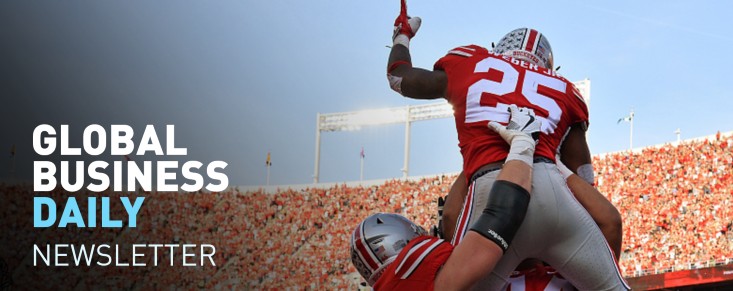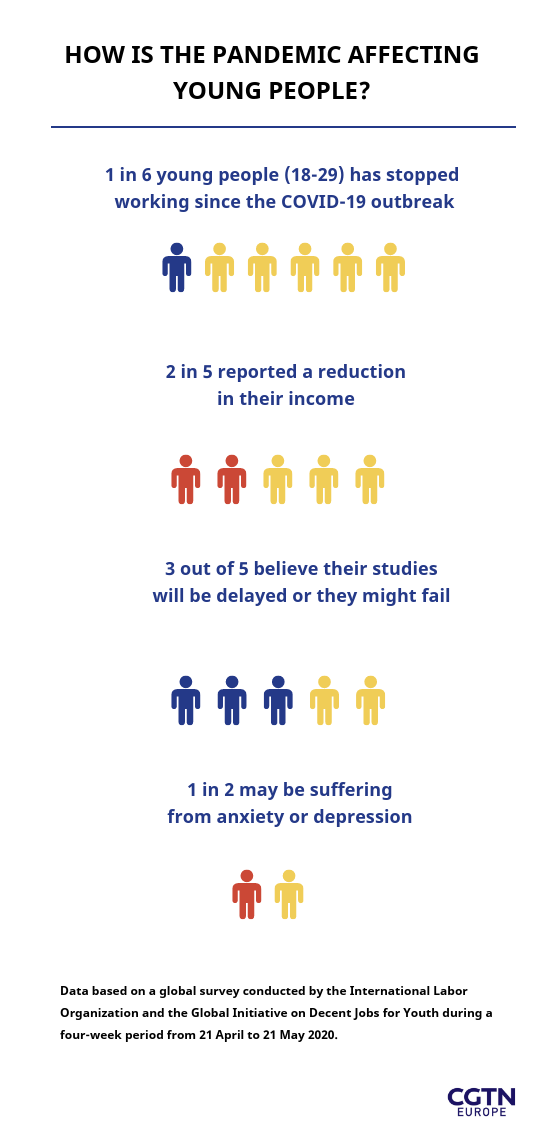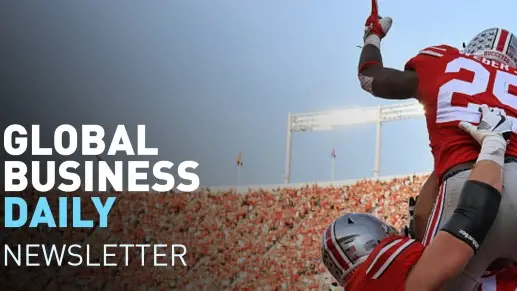"I said that hard times were coming. And... hard times are here."
That's the UK's finance minister, Rishi Sunak, reacting to the news the UK has fallen into recession after a second successive quarter of crashing GDP figures.
I don't want to dwell on that news for too long, so if you're looking for British content I'll instead point you towards today's video. Our correspondent Nawied was in Scotland yesterday and sent us this report on the first day back at school for many Scottish teens.
Now, you may be asking why today's picture is a sporting one... and well you may – this is a business newsletter after all. But in the U.S., college or university sport is a big deal . Last year it was worth at least $8 billion. With two top leagues saying they will not play amid the pandemic, that total could be cut by as much as $3 billion. There is a lot of sponsorship and institutional income reliant on the crowds, TV rights and other sales.
There's a lot of results-based news today, as companies post their half-year figures. But I'll let you explore these stories at your leisure. For those not interested in the ups and downs of market leaders, scroll to see my colleague Giulia's graphic, which focuses on youth unemployment and how the pandemic has affected those just starting their careers.
Happy reading,
Patrick Atack
Digital business correspondent
**P.S. Did you know we send this briefing by email, too? **
Sign up here

Britain's economy fell into recession after ** contracting by a record 20.4 percent in the second quarter** . The UK officially
entered recession with a second successive quarter of decline
, following the2.2 percent shrinkage in the first three months of the year.
EU trade sanctions on Cambodia have come into force. Cambodia has lost its access to the EU's "Everything But Arms" trade arrangement for the least-developed countries, which will hit typical exports such as garments, footwear and travel goods.
Two of the top conferences in U.S. college football have said they will not compete in fall 2020 due to the ongoing COVID-19 pandemic. The Pacific-12 and "Big 10" leagues are worth $1 billion and $1.8 billion respectively and their suspension could cause serious financial repercussions for the universities involved.
Restaurants may be struggling with light footfall, but food delivery group Just Eat Takeaway.com has been a winner of the myriad lockdowns across Europe . In the first six months of 2020 it's recorded revenues of $1 billion – a 44 percent increase on the half-year mark in 2019. Despite some lockdown easing, the company said it expected strong growth to continue.
Chinese tech giant Tencent
– which owns the messaging app WeChat – has recorded a better-than-expected second quarter, with revenues up 37 percent and profits up 29 percent , both on the year. Transactions through its mobile payment app drove the hikes, which grew after China's lockdown began to lift.
The global oil producers' organization OPEC has cut its expected oil demand, saying it will fall by at least 9 million barrels per day (bpd), up from the 8.95 million bpd decline it predicted earlier in the year. OPEC warned that jet fuel losses caused by the pandemic would "struggle" to make up for lost demand in 2021.
Cathay Pacific Airways confirmed a record loss for the second quarter, with ** $1.2 billion lost since the start of 2020** . The Hong Kong-based airline blamed the pandemic for the loss of passengers, though it said a silver lining may be the cargo side, as it made more money than passenger flights since January.
German travel agency TUI has reached a $1.4 billion agreement with the Berlin government to provide liquidity as the firm continues to struggle as world travel remains largely suspended. TUI agreed with state-owned lender KfW to extend the existing credit line.
Foxconn, the firm that produces the majority of Apple iPhones, beat expectations with its quarterly results – and forecast growth, with a new iPhone model on the horizon. Profits are up by more than 30 percent , compared with the same period in 2019.
Dublin-based Hostelworld, which operates a booking platform for a global network of youth hostels, said today there was a rise in bookings at European hostels in June, but international sites were struggling significantly. It added that approximately nine percent of its 17,000 hostels had closed for good, due to the pandemic.
Halo Infinite
, the next instalment of the** video game series **Halo
, is being delayed until next year. That means it will miss the launch of Microsoft's new console later this year. "We have made the difficult decision to shift our release to 2021 to ensure the team has adequate time to deliver a Halo
game experience that meets our vision," said the developer's chief, Chris Lee.
WATCH: Students in Scotland began to return to school on Tuesday ** – almost 700,000 students have been learning from home since March due to the coronavirus pandemic.**
Guidance issued to councils said children should "return to school as quickly and as safely as possible."
02:52

Simon Freakley, CEO of AlixPartners, spoke to CGTN Europe about the volatile retail sector and how it's been affected by the pandemic and subsequent lockdown.
What can you tell us about the pre-existing problems the global retail sector had been experiencing before the COVID-19 crisis?
The retail industry globally was being profoundly disrupted, even before the pandemic came along.
The pandemic that came along, of course, was the mother of all disruptions, but it was only the latest disruption for the retail industry.
Tell us about the success of online sales compared with in-store sales and what costs and challenges are associated with running both in the COVID-19 environment?
One generally thinks [businesses] with an online strategy have thrived during the pandemic and to some extent that is true.
Groceries, for instance
– people typically bought their groceries in store rather than online. Certainly in developed Western economies, that has changed, there has been a violent swing to online, [but] the profitability of a companies has gone down because it's costing them more to fulfill those orders.
AlixPartners is known for restructuring companies, but also advising clients on new strategies. What's the general trajectory that you see for retail going forward?
What we're working a lot on with our customers is understanding the data they've got, so that from the way in which they go to market, but also the way in which they set up their supply chain, the way they keep their order volumes agile, they are going to be winners coming out of a profound disruption like the pandemic.

 简体中文
简体中文





